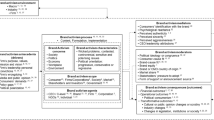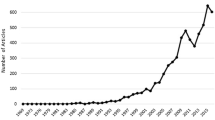Abstract
This is a case study investigating the growth of fair trade pioneer, Cafédirect. We explore the growth of the company and develop strategic insights on how Cafédirect has attained its prominent position in the UK mainstream coffee industry based on its ethical positioning. We explore the marketing, networks and communications channels of the brand which have led to rapid growth from niche player to a mainstream brand. However, the company is experiencing a slow down in its meteoric rise and we question whether it is possible for the company to regain its former momentum with its current marketing strategy.
Similar content being viewed by others
Abbreviations
- FtF:
-
Fairtrade Foundation
- FLO:
-
Fairtrade Labelling Organisation
- PPP:
-
Producer Partnership Programmes
- R&G:
-
Roast and Ground Coffee
- CEO:
-
Chief Executive Officer
- IPO:
-
Initial Public Offering
- ATO:
-
Alternative Trading Organisation
- DfID:
-
Department for International Development
References
Aaker, D.A.: 2004. Brand Portfolio Strategy, (Free Press, New York).
Askey, H. and Knight, P.: 1999, Interviewing for Social Scientists, (Sage Publications, London).
Barnes, D. M. 1996.: ‹An analysis of the grounded theory method and the concept of culture’, Qualitative Health Research, 6, 429-41.
BBC News: 2006, ‹How Fair is Fairtrade’, http://news.bbc.co.uk/1/hi/business/4788662.stm. Accessed 9 Feb 2009
Brown, B. M. 1993.: Fair Trade, (Zed Books Ltd, London).
Brown B. M.: 2007, ‹Fair Trade with Africa’, Review of African Political Economy, 112, 267-277.
Cafédirect plc.: 2001, ‹Cafédirect plc Report and Financial Statements 1998-1999’, (Baker Tilly International, London).
Cafédirect plc.: 2001, ‹Cafédirect plc Report and Financial Statements 1999-2000’, (Baker Tilly International, London).
Cafédirect plc.: 2002, ‹Cafédirect plc Report and Financial Statements 2000-2001’, (Baker Tilly International, London).
Cafédirect plc.: 2003, ‹Cafédirect plc Report and Financial Statements 2001-2002’, (Baker Tilly International, London).
Cafédirect plc.: 2005, ‹Cafédirect plc Report and Financial Statements 2003-2004’, (Baker Tilly International, London).
Cafédirect plc.: 2006, ‹Cafédirect plc Report and Financial Statements 2004-2005’, (Baker Tilly International, London).
Cafédirect plc.: 2007, ‹Cafédirect plc Report and Financial Statements 2005-2006’, (Baker Tilly International, London).
Cafédirect plc.: 2008, ‹Cafédirect plc Report and Financial Statements 2006-2007’, (Baker Tilly International, London).
Connolly,J. And Shaw, D. 2006:. Identifying fair trade in consumption choice, Journal of Strategic Marketing, 14, 4, p:353-368.
Cookson, R.: 2005, ‹String-Along or Beanfeast?, The Guardian Weekly, pp. 20–21
Davies, I.A.: 2007, ‹The eras and participants of fair trade: an industry structure/stakeholder perspective on the growth of the fair trade industry.’ Corporate Governance, 7(4), 455-470.
Davies, I. A.: 2009, ‹Alliances and Networks: Creating Success in the UK Fair Trade Market’, Journal of Business Ethics 86(S1), 109–126.
Davies, I.A. and Crane, A.: 2003, ‹Ethical decision making in Fair Trade companies’, Journal of Business Ethics, 45, 79-92.
Doherty, B. and Tranchell, S.: 2007, ‹“Radical Mainstreaming” of fair trade: the case of the Day Chocolate Company’, Equal Opportunities International, 26(7), 693-703.
Eisenhardt, K. M.: 1989, ‹Building theories from case study research’ Academy of Management Review, 14(4), 532-550.
Fairtrade Foundation: 2007, Fairtrade Foundation Annual Review London
Fairtrade Foundation: 2008, http://www.fairtrade.org.uk/what_is_fairtrade/facts_and_figures.aspx. Accessed 20 Dec 2008
Fairtrade Labeling Organisation: 2008, FLO Annual Report, (Bonn, Germany).
FINE: 2001, ‹Definition of Fair Trade’, http://www.fairtrade.net/about_fairtrade.html. Accessed 18 Mar 2008
Glaser, B.: 1992, Basics of Grounded Theory Analysis: Emergence v Forcing, (The Sociology Press, Mill Valley).
Golding, K. and Peattie, K., 2005, ‹In search of a Golden Blend: Perspectives on the Marketing of Fair Trade Coffee’, Sustainable Development, 13, 154-165.
Goulding, C.: 2001, ‹Grounded theory: A magical formula or a potential nightmare’ The Marketing Review, 2(1), 21-34.
Kappler, D. 2001.: Quoted in ‹fair trade chocolate – the argument continues’ Corporate Finance, 204: 18.
Low, W. and Davenport, E.: 2005a, ‹Postcards from the Edge: maintaining the “alternative” character of fair trade’, Sustainable Development, 13, 143-153.
Low, W. and Davenport, E.: 2005b, ‹Has the medium (roast) become the message? The ethics of marketing fair trade in the mainstream’. International Marketing Review, 22(5), 494-511.
Low, W. and Davenport, E.: 2006. ‹Mainstreaming Fair Trade: Adoption, assimilation, appropriation’, Journal of Strategic Marketing, 14(4), 315-328.
McDonagh, P.: 2002, ‹Communicative campaigns to effect anti-slavery and fair trade: The case of Rugmark and Cafédirect’, European Journal of Marketing, 36(5&6), 642-667.
Mintel,: 2008, Coffee – UK, (Mintel International Group Limited, London).
Mintzberg, H.: 1979, ‹An emerging strategy of ‹direct’ research’, Administrative Science Quarterly, 24, 582-589.
Moore, G.: 2004, ‹The fair trade movement: parameters, issues and future research’ Journal of Business Ethics, 53 (1-2), 73-87.
Moore, G, Gibbon, J and Slack, R.: 2006, ‹The mainstreaming of Fair Trade: a macromarketing perspective’, Journal of Strategic Marketing, 12(4), 329-352.
MORI: 2005, Fairtrade Foundation Awareness Research 2005, (Market and Opinion Research International, London).
Murray, D. and L. Raynolds: 2000 Alternative Trade in Bananas: Obstacles and Opportunities for Progressive Social Change in the Global Economy’ Agriculture and Human Values 17, 65–74.
Murray,L. D., Raynolds, T, L. and Taylor, L, P.: 2006, ‹The future of Fair Trade coffee: dilemmas facing Latin America’s small-scale producers’, Development in Practice, 16(2), 179-192.
Nicholls, A. J.:2002, ‹Strategic Options in Fair Trade Retailing’, International Journal of Retail and Distribution Management 30(1), 6–17.
Nicholls, A. and Opal, C.: 2005, Fair Trade: market-driven ethical consumption (Sage Publications, London).
Parker, G.: 1999, ‹The Role of the Consumer-citizen in Environmental Protest in the 1990’s’, Space, and Polity, 3, 67-83.
Raynolds L. T., Murray, D. and Taylor, P.L.: 2004, ‹Fair trade coffee: Building producer capacity via global networks’, Journal of International Development, 16(8), 1109–1121.
Raynolds, L. T., Murray, D. L. and Wilkinson, J.: 2007, Fair Trade. The challenges of transforming globalization, (Routledge, London).
Ronchi, L.: 2001, Fair Trade Chocolate Impact Monitoring and Evaluation (University of Sussex: Brighton).
Rubin, H. J. and Rubin, I. S.: 1995, Qualitative Interviewing: The art of Hearing Data, (Sage, London).
Spiggle, S.: 1994, ‹Analysis and interpretation of qualitative data in consumer research’ Journal of Consumer Research, 21(3), 491-503.
Strong, C.: 1996, ‹Feature contributing to the growth of ethical consumerism – A preliminary investigation’ Marketing Intelligence & Planning, 14(5), 5-13.
Strong, C.: 1997, ‹The Problems of Translating Fair Trade Principles into Consumer Purchase Behaviour’, Marketing Intelligence and Planning 15(1), 32–37
Strong, C.: 1997b, ‹The role of fair trade principles within sustainable development’, Sustainable Development, 5, 1-10.
Tallontire, A.: 2000, ‹Partnerships in fair trade: reflections from a case study of Cafédirect’ Development in Practice, 10(2): 166-177.
Tallontire, A., Rentsendorj, E. and Blowfield, M.: 2001, Ethical consumers and Ethical Trade: a review of current literature, (Natural Resources Institute, Chatham).
Taylor, L, P.; Murray, L, D. and Raynolds, T, L.: 2005, ‹Keeping Trade fair: Governance challenges in the Fair Trade coffee initiative’, Sustainable Development, 13, 199-208.
Teather, D.: 2006, ‹Big Retailers Help Raise Fairtrade Sales by Third’, The Guardian, 28 June, p. 24
The Economist: 2006, ‹Voting with your trolley: can you really change the world by buying certain foods’ The Economist, 381(8507),73-75.
The Guardian: 1998, ‹Short in Fair Trading Row’, The Guardian, 1 Sept, p. 22
Urry, J.: 1995, Consuming Places (Routledge: London).
Valor, C.: 2006,‹What if all Trade was Fair Trade? The Potential of a Social Clause to Achieve the Goals of Fair Trade’, Journal of Strategic Marketing 14, 263–275.
Van Maanen, J.: 1979, ‹The fact of fiction in organizational ethnography’ Administrative Science Quarterly, 24, 539-550.
Wilkinson, J.: 2007, ‹Fair Trade: Dynamic and dilemmas of a market oriented global social movement’, Journal of Consumer Policy, 30, 219-239.
Wright, C.: 2004, ‹Consuming lives, consuming landscapes: Interpreting advertising for Cafédirect coffee’, Journal of International Development, 16(5), 665-680.
Yin, R.: 1994, Case Study Research: Design and Methods, 2nd edition (Sage Publications, London).
Author information
Authors and Affiliations
Corresponding author
Rights and permissions
About this article
Cite this article
Davies, I.A., Doherty, B. & Knox, S. The Rise and Stall of a Fair Trade Pioneer: The Cafédirect Story. J Bus Ethics 92, 127–147 (2010). https://doi.org/10.1007/s10551-009-0145-6
Received:
Accepted:
Published:
Issue Date:
DOI: https://doi.org/10.1007/s10551-009-0145-6




